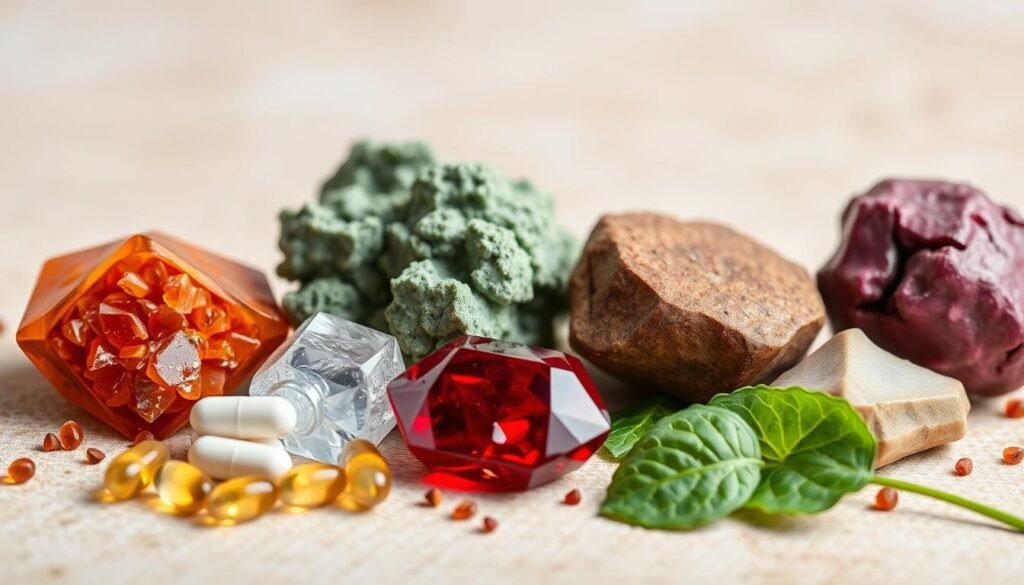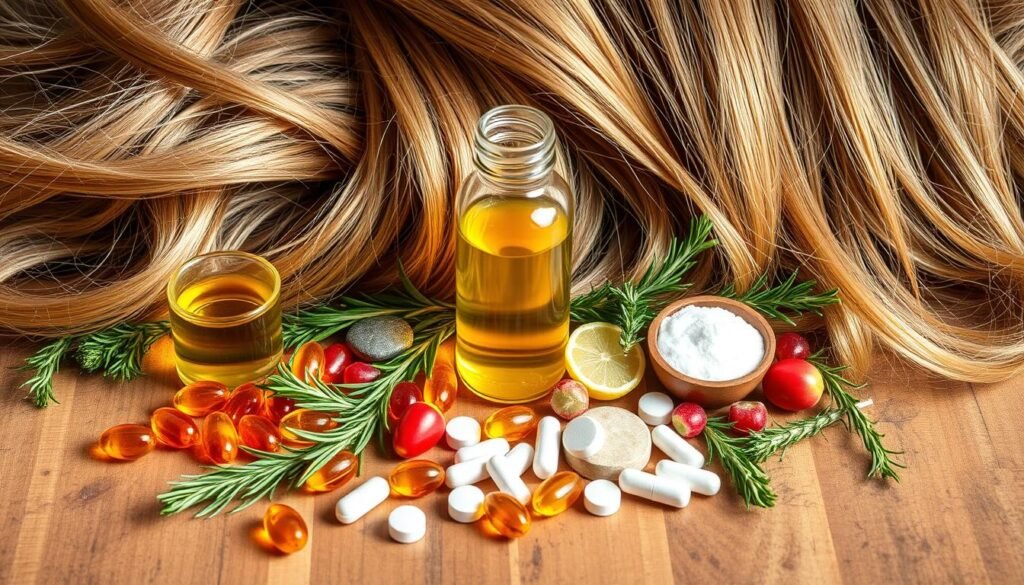About 50 million men and 30 million women in the United States lose their hair. This fact shows we need good solutions, and they often start with Vitamins and Minerals for Hair Health. Vitamins and minerals are really important for keeping hair healthy and growing. We’ll look at the best vitamins and minerals for this and how eating right helps a lot.
Knowing what your hair needs can help make it healthier. Vitamins like B-complex give energy to your hair, and iron is super important too. It’s all part of helping your hair grow well. Also, it’s good to know that managing stress and keeping hormones balanced is key. If you’re curious how hormones affect hair, read more here.
Key Takeaways
- Essential vitamins and minerals are crucial for maintaining healthy hair.
- A balanced intake of nutrients can support hair growth and vitality.
- Stress management is important for hair health alongside nutrition.
- The vitamin B-complex is known to energize and stimulate hair follicles.
- Iron plays a pivotal role in delivering nutrients to hair follicles.
- Incorporating a variety of foods can enhance the effectiveness of vitamins and minerals.
Understanding Hair Growth
The hair growth cycle is made up of three key phases: anagen, catagen, and telogen. Each phase is vital for hair’s health and length. In the anagen phase, hair grows from its roots for several years.
The catagen phase is a short transition when hair stops growing. It separates from the follicle. Next, the telogen phase is a rest period that lasts a few months. Here, hair falls out, allowing new strands to appear.
Knowing the stages of hair growth shows why follicle health is important. Nutrients are crucial for supporting these stages. Without them, hair growth can suffer. A study by the National Institutes of Health links vitamins and minerals to hair health. It shows why good nutrition is key for the hair growth cycle.
The Importance of Nutrients for Hair Health
Nutrients are key for keeping hair strong and healthy. Eating the right vitamins helps avoid hair problems. Not getting enough can cause weak hair or even hair loss.
Research shows vitamins and minerals are crucial for hair. Visiting this page can tell you how nutrition affects your hair. Without the right nutrients, hair might grow slowly or get thin.
A balanced diet provides all the vitamins and minerals needed. Eating a variety of foods is essential. Adding foods high in vital nutrients supports hair health well.

To sum up, getting enough vitamins prevents hair loss and promotes full, healthy hair. Keeping up with nutrition is key to having healthy hair and overall health.
Essential Vitamins for Hair Growth
Having strong and healthy hair needs a diet full of essential vitamins. These vitamins are key for hair growth and health. Knowing the benefits of certain vitamins helps people choose the right foods.
Vitamin A: The Key to Cell Growth
Vitamin A is crucial for cell growth and making sebum. Sebum keeps hair moist. This vitamin helps hair follicles grow strong, leading to vibrant hair. Eat more sweet potatoes, carrots, and spinach to boost your vitamin A.
Vitamin B-Complex: Energizing Your Hair
Vitamin B complex includes many vitamins that boost energy and hair health. These vitamins improve blood flow to the scalp and support hair growth. Eating whole grains, eggs, and nuts provides a good supply of vitamin B.
Vitamin E: Enhancing Circulation
Vitamin E improves blood flow to the scalp. This helps get nutrients to hair follicles. It also fights damage to your hair. To get more vitamin E, eat almonds, sunflower seeds, and avocados.
Essential Minerals for Strong Hair
A balanced diet full of essential minerals is key for strong, healthy hair. Iron and zinc are especially important. They play big roles in hair health and growth.
Iron: The Lifeline for Hair Follicles
Iron is vital for sending oxygen to hair follicles. It helps produce energy, which is crucial for growing thick, strong hair. Not having enough iron can cause hair to thin or fall out. To meet iron needs, eat leafy greens, red meat, and legumes.
Zinc: Crucial for Repair and Function
Zinc is important for keeping hair strong and healthy. It helps with hair growth and repairs hair tissue. Not getting enough zinc can result in hair loss because it affects how hair follicles work. Eat pumpkin seeds, lentils, and nuts for a good zinc intake. Adding these foods to your diet improves zinc levels and hair growth.

Highlighting the role of iron and zinc helps people improve their hair through their diet. For more tips on key nutrients for hair health, check out this resource.
Vitamins and Minerals for Hair Health
Your hair needs a mix of vitamins and minerals to be healthy. Different nutrients work together to help your hair grow well and stay strong. Knowing which nutrients support each other helps you take better care of your hair.
Combining Nutrients for Optimal Results
Pairing certain vitamins with minerals boosts hair health. These combos make your hair follicles stronger and help your hair grow. For example:
- Vitamin C and iron: Vitamin C helps your body use iron, bringing oxygen to your hair roots.
- Biotin and zinc: They work together to fix cells, making your hair healthier.
- Vitamin E and selenium: They improve blood flow to your scalp, feeding your hair at the root.
To keep your hair healthy, focus on eating a variety of nutrient-rich foods. A balanced diet helps prevent nutrient shortages and supports hair growth. Remember, how you combine nutrients can make your hair even healthier.
Best Vitamins for Hair Growth
People looking to boost hair growth should know about the best vitamins. Different vitamins offer unique benefits that improve hair health.
Here are the essential vitamins:
- Vitamin A: It is crucial for cell growth. This vitamin helps produce sebum to keep hair moisturized.
- B-Complex Vitamins: B7 (Biotin) and B12 are key. They help produce energy and form red blood cells to feed hair follicles.
- Vitamin C: This antioxidant shields follicles from harm. It also supports collagen production, vital for hair.
- Vitamin D: It plays a role in making new follicles. This is important for healthy hair growth.
- Vitamin E: It boosts blood flow to the scalp. This lays a healthy foundation for hair to grow.
Research shows these vitamins can improve hair health if taken regularly. Eating various foods or taking supplements that contain these vitamins can noticeably boost hair growth.

Foods Rich in Hair Growth Nutrients
Eating the right foods for hair growth can boost hair health and strength. A diet full of natural sources of vitamins and essential minerals is key. It helps in giving your hair the hair growth nutrients it needs to be stronger and healthier.
Leafy Greens: A Powerhouse of Vitamins
Leafy greens like spinach, kale, and Swiss chard are full of iron, calcium, and vitamins A and C. These nutrients are crucial for keeping hair follicles healthy. The vitamins in leafy greens make hair cells happy and improve scalp health overall.
Nuts and Seeds: Nature’s Hair Supplements
Nuts and seeds are great natural sources of vitamins and healthy fats. They include walnuts, almonds, flaxseeds, and pumpkin seeds. These foods are full of omega-3 fatty acids, zinc, and vitamin E, which all support hair follicles and help prevent hair loss.
| Food Type | Nutrients | Benefits |
|---|---|---|
| Leafy Greens | Vitamins A, C, Iron | Strengthens hair follicles and nourishes the scalp |
| Nuts | Omega-3 Fatty Acids, Zinc, Vitamin E | Promotes healthy hair growth and improves shine |
| Seeds | Protein, Vitamins, Healthy Fats | Supports overall hair health and reduces brittleness |
Adding these foods to your daily meals is a strong way to get important hair growth nutrients. Choosing a diet rich in these can show a commitment. It’s not just about better hair, but also about better overall health.
Hair Growth Supplements: Are They Effective?
Many people use hair growth supplements to keep their hair healthy. They hope these supplements will make their hair strong and vibrant. The supplements have vitamins and minerals said to help with growth and prevent hair loss. Yet, how well they work depends on what’s in them, how much you take, and your own health.
Choosing the Right Supplements
It’s important to pick the right hair supplements. Look for key ingredients like biotin, iron, and zinc. These are known to help hair health. Not all products have enough of these nutrients for the best results. Knowing what each nutrient does can help you make a smart choice.
Consulting Healthcare Professionals
Talking to healthcare professionals before starting supplements is vital. They can give advice that fits your health and needs. They can also tell you about any risks with your current medicines and diet. With their help, you can learn how to use hair growth supplements effectively. Choosing the right supplements can boost your chances of having healthier hair.